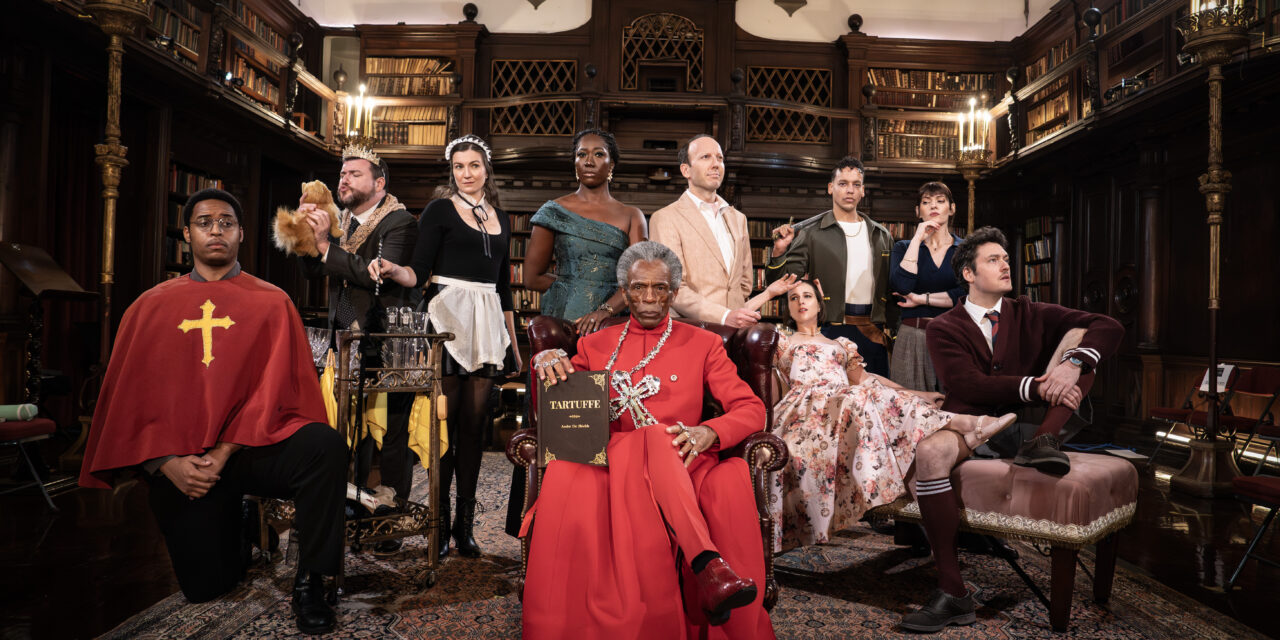By Melissa Griegel…
Photos by Joan Marcus
One of the most unique and entertaining theater offerings this season is André De Shields is Tartuffe. Running at the House of the Redeemer (7 East 95th St.) through November 23, 2025, with a possibility of an extension, this is one experience not to be missed. The show is staged in an historic Upper East Side mansion rarely opened to the public. This is the first time the House of Redeemer has been home to a theatrical production, which takes place in a 400-year-old library decorated to the hilt, with live music and singing as you climb the grand staircase and enter the doors of the library.
Starring Tony Award® winner and Broadway legend André De Shields (Hadestown), the 100 guests are seated around the room offering an intimate experience where the actors are mere feet, sometimes inches, away. This highly engaging performance of Molière‘s 1664 play Tartuffe had been made accessible by the wit and humor of Ranjit Bolt’s (OBE) modern translation. While the original French was written in alexandrines (12 syllable lines with six beats in rhyming couplets), Bolt’s 2002 translation uses heroic couplets and shorter, more modern phrasing, generally with four beats, and condenses some of longer speeches. Richard Wilbur’s 1967 translation is considered to be the modern standard, but Bolt’s version is praised for making the story more accessible to audiences with colloquial phrasing and a larger emphasis on the humor.

Critics of the translation view it as a dumbing down of Molière’s work, while others praise it for breathing new life into the 17th century work. Although at times, it could make you feel as if you are listening to a grown-up Dr. Seuss book, his translation absolutely resonated with the audience as witnessed by the uproarious laughter and applause, and an occasional shout-out from a guest. With Drew Wutke at the grand piano, and the furious fast-paced action of the actors swirling all around you, every person in the room seemed thoroughly engaged and delighted by the spectacle of Tartuffe.

The star, of course, was Broadway deity André De Shields who makes his grand entrance in Act III. Walking regally into the room with his long red robe and fanfare, De Shields delighted the audience with his perfect elocution, his elegance, and occasionally, a song. He was matched in talent by a fantastic cast. I thoroughly enjoyed seeing Amber Iman (Lempicka) in a humorous role as Orgon’s wife Elmire and she did it well. A real stand-out for me was Phoebe Dunn who was fantastic as the maid Dorine who plays a central role in the storyline. Alexandra Socha (Wicked) and Charlie Lubeck were perfectly matched as the foolish young couple in love (Mariane and Valère) who played their roles with gaiety and fun. Socha’s facial expressions were fabulous and Lubeck’s physical humor made them a delightful pair. Likewise, Tyler Hardwick (Once on This Island) as Damis and Todd Buonopane (Cinderella) brought hilarity to their roles in facial expression and body language. Chris Hahn brought fervor to the leading role of Orgon, the head of this wealthy aristocratic family and played off Hannah Beck‘s stern Cléante, his sister-in-law. Marcus Fitzpatrick, in his non-speaking role as servant Laurent, helped move the action along.

André De Shields is Tartuffe was expertly directed by Keaton Wooden. Drew Wutke on the keys and the actors warm up the crowd before the start of the show by engaging everyone in singing along to upbeat tunes such as “I’m Gonna Be (500 miles)”. The music director becomes part of the show at times, in particular when the hilarious Hardwick motions to him for musical cues for his entrances and exits. De Shields is in fine form belting out an occasional tune and even doing push-ups during the show. There are lots of fun details poking fun at the characters including Orgon drinking from a “Best Dad” coffee mug, and two characters reaching for each other à la Michelangelo’s Creation of Adam Hand of God.

Tartuffe was well-received by audiences when introduced in 1664, but was quickly suppressed by King Louis XIV due to pressure from the Catholic Church for the plotline poking fun at someone who feigns religious piety but is, in fact, a lecherous and deceitful scoundrel. Despite this, Louis XIV did continue to support the playwright and private performances of the play took place. In 1669, detractors of the play lost much of their influence and he was allowed to perform his final version of the play publicly.

The story is of one a wealthy man who is utterly taken in by a seemingly pious man, who is in fact after his wife and his wealth. Orgon offers Tartuffe the hand of his daughter and signs over his land and his home to the scheming Tartuffe. In turn, Tartuffe is exposed, but only after Orgon has lost everything to him. Using the theatrical plot device deus ex machina (God from the machine), the seemingly unsolvable problems of the characters are suddenly and unexpectedly resolved by an abrupt resolution, in this case with King Louis XIV himself helping the poor Orgon. The play has had other influences on modernity in convention and language, such as the word tartuffe being used to describe a hypocrite, particularly one who outwardly and ostensibly feigns virtue or religious piety but is actually deceitful and untrustworthy.

Interestingly, there is another version of Tartuffe coming to Broadway this fall at the New York Theatre Workshop (https://www.nytw.org/) with Matthew Broderick as Tartuffe and David Cross as Orgon. The show begins November 28th with a new translation by Lucas Hnath. The show will be directed by Sarah Benson with choreography by Raja Feather Kelly.
Catch André De Shields is Tartuffe now in its limited run at The House of the Redeemer https://www.houseoftheredeemer.org/. Seating is general admission, with every spot offering a close-up view of the production. For those seeking the height of exclusivity, premium VIP tickets provide a pre-show experience with live music and early entry. For more information, or to purchase tickets, go to https://www.tartuffenyc.com/.






